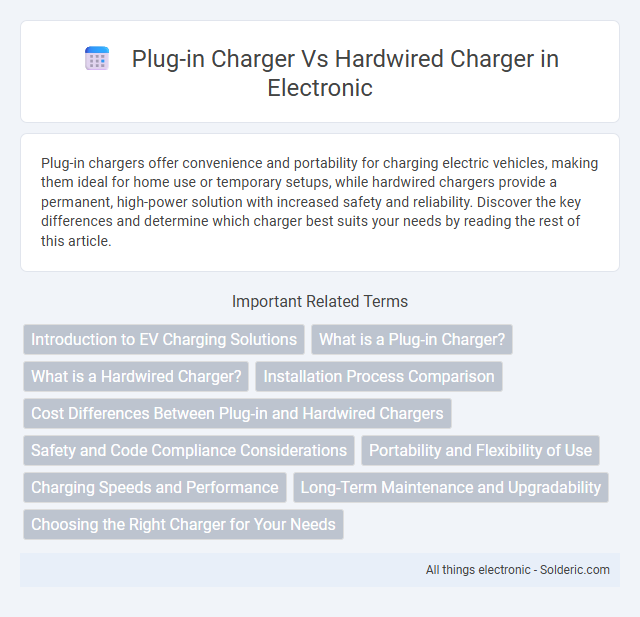Plug-in chargers offer convenience and portability for charging electric vehicles, making them ideal for home use or temporary setups, while hardwired chargers provide a permanent, high-power solution with increased safety and reliability. Discover the key differences and determine which charger best suits your needs by reading the rest of this article.
Comparison Table
| Feature | Plug-in Charger | Hardwired Charger |
|---|---|---|
| Installation | Simple, plug into existing outlet | Requires professional wiring and installation |
| Portability | Highly portable and easy to relocate | Permanently fixed to one location |
| Power Output | Typically lower (up to 7.7 kW) | Higher power, supports faster charging (up to 22 kW or more) |
| Cost | Lower initial cost, minimal installation charges | Higher upfront cost including installation |
| Safety | Dependent on outlet and plug quality | Higher safety standards, fixed wiring reduces hazards |
| Use Case | Best for renters, temporary use, or low power needs | Ideal for homeowners, long-term use, high power demands |
Introduction to EV Charging Solutions
Plug-in chargers offer the flexibility of easy installation and portability, allowing your electric vehicle to be charged anywhere with a compatible outlet, while hardwired chargers provide a permanent, higher-powered solution fixed directly to your electrical system. Hardwired chargers typically deliver faster charging speeds due to their dedicated circuit connection, making them ideal for frequent, daily EV use. Choosing between plug-in and hardwired options depends on your EV charging needs, installation preferences, and available electrical infrastructure.
What is a Plug-in Charger?
A plug-in charger is a portable electric vehicle (EV) charging device that connects directly to a standard power outlet, allowing easy installation and flexibility for home or public use. It offers convenience by simply plugging into the socket without the need for permanent wiring, making it ideal for renters or those who require mobility. Your EV can benefit from the straightforward setup of a plug-in charger, providing reliable charging without complex installation requirements.
What is a Hardwired Charger?
A hardwired charger is an electric vehicle (EV) charging unit permanently installed and directly connected to a building's electrical system, providing a reliable and high-capacity power source. Unlike plug-in chargers that use a standard electrical outlet and a detachable cable, hardwired chargers ensure consistent power delivery with reduced risk of disconnection or electrical faults. This setup is common in residential and commercial EV charging solutions aiming for enhanced safety, durability, and faster charging speeds.
Installation Process Comparison
Plug-in chargers offer a straightforward installation process, requiring only a standard electrical outlet, making them ideal for quick setup without professional help. Hardwired chargers demand a more complex installation involving direct wiring to your home's electrical system, typically necessitating a licensed electrician to ensure safety and compliance with local codes. Your choice depends on convenience and whether you prefer a DIY approach or a more permanent, high-capacity charging solution.
Cost Differences Between Plug-in and Hardwired Chargers
Plug-in chargers typically have a lower upfront cost compared to hardwired chargers due to simpler installation requirements that often don't require professional electrician services. Hardwired chargers involve higher expenses for both equipment and installation, as they must be directly connected to your electrical panel, which can include upgrading your circuit. Choosing the right charger depends on balancing the initial cost with long-term convenience and electrical capacity for your charging needs.
Safety and Code Compliance Considerations
Plug-in chargers offer flexibility and ease of installation but may pose higher risks of accidental disconnection or damage, impacting safety and potentially failing to meet strict electrical code requirements. Hardwired chargers ensure a secure, permanent connection that aligns with National Electrical Code (NEC) standards, minimizing hazards like loose wiring or electrical fires. Your choice should prioritize compliant installation by a licensed electrician to guarantee both safety and adherence to local regulations.
Portability and Flexibility of Use
Plug-in chargers offer superior portability, allowing you to easily move and use them in various locations without professional installation. Hardwired chargers, while often more reliable for permanent setups, lack the flexibility to be relocated without rewiring. Your choice depends on whether mobility or a fixed charging solution better fits your lifestyle and device usage.
Charging Speeds and Performance
Plug-in chargers typically offer moderate charging speeds suitable for home or public use, supporting level 1 or level 2 charging with power outputs ranging from 3.3 kW to 19.2 kW. Hardwired chargers provide higher performance and faster charging capabilities by directly connecting to the electrical system, often delivering up to 22 kW or more for compatible electric vehicles. The direct integration of hardwired chargers reduces energy loss, enhances charging efficiency, and supports consistent power delivery for quicker battery replenishment.
Long-Term Maintenance and Upgradability
Plug-in chargers offer easier long-term maintenance and greater upgradability since they can be quickly replaced or upgraded without professional installation, reducing downtime and costs. Hardwired chargers typically require an electrician for repairs and upgrades, making maintenance more complex and potentially expensive over time. Your choice impacts future flexibility, with plug-in options providing a more convenient path for adapting to evolving technology standards.
Choosing the Right Charger for Your Needs
Choosing between a plug-in charger and a hardwired charger depends on your specific usage requirements and installation preferences. Plug-in chargers offer portability and ease of installation, making them ideal for renters or those who need a flexible charging solution, while hardwired chargers provide a more permanent, streamlined setup with higher power capacities suitable for heavy use. Assess your charging frequency, electrical infrastructure, and future needs to select the charger that optimally supports your electric vehicle lifestyle.
Plug-in charger vs Hardwired charger Infographic

 solderic.com
solderic.com